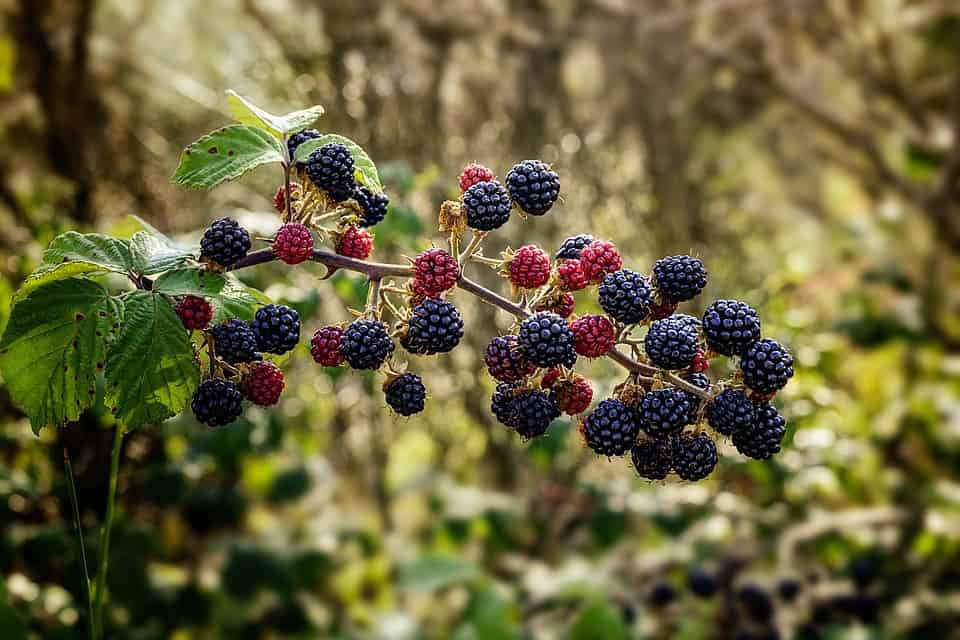Perennial fruiting shrubs like blackberries and raspberries are a gift that keep on giving year after year. Not only are they ideal for jams, jellies, pies, and sauces, they are also great for fresh eating. And homegrown berries are almost always sweeter and more flavorful than their grocery store cousins.
But if your blackberries and raspberries are not up to par when it comes to sweetness, and your plants look otherwise healthy and productive, there are a few possible culprits, and almost all of them are easily fixable.
On this page:
1. Pick Blackberries and Raspberries When They’re Ripe
Blackberries and raspberries are at their sweetest when fully ripe. Picking them too early means they will be more tart and if very underripe, they can be bitter.
Probably the #1 reason why blackberry and raspberry growers get less-than-sweet harvests is because they’re picked while only partially ripe. Even the sweetest varieties of berries won’t be as sweet if picked early.
Most commercially grown blackberries and raspberries are picked unripe because they can handle transport better, and have a longer shelf life. It’s the same reason why grocery store tomatoes are picked unripe (and are equally less flavorful). Fully ripe blackberries and raspberries can be easily damaged while harvesting and spoil quickly, but they will be at their peak sweetness and flavor.
How to Tell if Blackberries Are Ripe
Mature blackberries are completely dark, very soft, and have dull rather than shiny skin.
It’s not uncommon for gardeners to pick their blackberries too early because they pick them as soon as the berries turn black. But blackberries that are dark but still very shiny are actually partially ripe, and can still be fairly sour. Once their glossy skin begins to fade to a dull, matte black, that’s when they’re actually fully mature.
Fully ripe blackberries also tend to be very soft, which is another reason why commercially grown blackberries are recommended to be picked at the black-and-shiny stage.
How to Tell if Raspberries Are Ripe
Raspberries are fully ripe after they’ve turned a deep shade of their final color (deep red for most varieties). They will also be very soft and come off the plant easily.
Raspberries are more difficult to tell when they’re fully ripe, but will turn a deeper shade of red. Pink or light red raspberries are not fully ripe and taste less sweet and more tart.
Completely ripe raspberries are also very delicate, and readily release their juices when handled.
Just as with blackberries, commercially grown raspberries are often picked at the light red or pink stage, as they hold up better in transport and have a longer shelf life – at the cost of less sweetness.

2. Give Blackberries and Raspberries What They Need to Grow (Sun, Water, Nutrients)
Both blackberries and raspberries require full sun, rich soil, and enough water during growth and fruit development to ensure optimal sweetness and flavor.
Blackberries and raspberries are close relatives, so they have similar growing requirements, although some sources make different fertilizer recommendations for them.
Sun
As a rule of thumb, fruiting plants should get full sun so they can grow, bloom, and fruit properly. Blackberries and raspberries are no exception. Full sun is defined as at least 6 hours of direct, unfiltered sunlight per day. Plant your blackberries and raspberries somewhere where they won’t get shaded out by other plants or each other.
Water (and Soil)
Blackberries and raspberries both have relatively shallow roots, mostly within approximately 1 foot below the surface, meaning they can dry out more easily than other shrubs. Water accordingly, giving them more water during peak summer temperatures. At the same time, for the best results, they should be planted in loose, well-drained soil. If planting in containers, there should be adequate drainage holes. Both blackberries and raspberries don’t tolerate muddy, heavy soils.
Nutrients
Soil should also be amended with organic matter like compost or aged manure. You can also apply fertilizer for healthier plants and larger, higher-quality yields. If using slow release inorganic fertilizer, apply in early spring for both blackberries and raspberries, right before (or when) new growth begins. Nitrogen is especially important early in the season to support healthy vegetative growth, but any balanced NPK fertilizer is good for early spring applications. Blackberries and raspberries also benefit from a second application after a few months. If using organic fertilizer, apply at least a month earlier to give it time to break down and release nutrients into the soil. For liquid fertilizer applications, apply regularly (according to the instructions) from spring bud break to fruiting.
3. Grow Sweeter Blackberry and Raspberry Varieties
Not all blackberry and raspberry varieties are alike. Plant varieties in your garden that are naturally sweeter than others.
If you’re taking care of your blackberries and raspberries, harvesting them at the right time, and they’re still not achieving the level of sweetness you’re looking for, you can opt to grow varieties that were specifically bred for even better flavor and sweetness.
However, to unlock their full potential, they still need to be planted in a good location, given adequate water and nutrition, and picked when ripe.
Note: Yellow raspberries tend to have a milder overall flavor.
Below are some highly recommended blackberry and raspberry varieties by gardeners and field testers alike. Most of these are also relatively easy to find at plant vendors and garden centers.
Recommended Sweet and Flavorful Blackberry Varieties
- Marion (one of the most consistently sweet varieties in trials)
- Triple Crown (acclaimed for its flavor, even during the ‘shiny’ stage of ripeness)
- Navajo/Navaho (very sweet and productive with firmer ripe berries)
Recommended Sweet and Flavorful Blackberry Varieties
- Royalty (one of the sweetest purple raspberries)
- Himbo Top (very productive and super sweet red raspberry)
- Fall Gold (one of the sweetest yellow raspberries)
Sources
- Fernandez, G., Garcia, E., & Lockwood, D. (2015). Harvesting and postharvest management. NC State Extension Publications.
https://content.ces.ncsu.edu/southeast-regional-caneberry-production-guide/harvesting-and-postharvest-management
- Strik. B, et al. (2020). Growing raspberries in your home garden. OSU Extension Service.
https://catalog.extension.oregonstate.edu/sites/catalog/files/project/pdf/ec1306.pdf [PDF]
